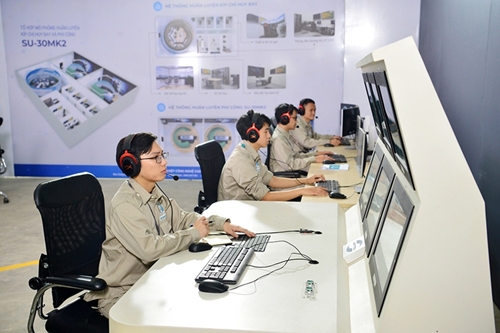In realizing the strategy of developing defense industry in a modern and dual-use direction, VHT has entered a new playground in which it has studied metaverse to create useful real values.
Seeking ways
In recent years, chip manufacturers and entertainment companies worldwide have been planning to build a metaverse. Regarded as the future of technology and holding various definitions, metaverse generally means the mixture of a real and virtual world, using AR, VR, simulations, Internet, and core technology, and more.
    |
 |
|
A VHT engineer operates the SU-30MK2 flight commander and pilot training simulation complex in March 2020. |
Looking at the domestic market, metaverse has been only seen in the field of games and entertainment with the participation of small-scale enterprises. To date, no enterprise has been able to develop a complete ecosystem to enhance the application of metaverse to multi-industries and multi-fields.
In that context, VHT has oriented applying metaverse to various fields of life, creating a change from the closest needs of human.
According to Major General Duong Anh Tra, Director of VHT’s Simulation Modelling Center, with the metaverse, VHT targets to create a digital society that exists in parallel with the real world and then will be expanded globally. In addition, applications in the metaverse, covering different fields, including defense and security, are expected to bring a great source of revenue for Viettel Group.
In fact, in training and combat readiness duty performance of the military, simulators are necessary to increase visualization, training time while saving maintenance costs, and prolonging the life of weapons, vehicles, and equipment, contributing to the effective use of existing materiel. However, core technologies of simulation modelling are difficult to be transferred between countries. For instance, to build a simulator of an aircraft, the shortest way in common sense is to buy data from aircraft manufacturer and then build a simulation system. However, when VHT mentioned this issue to the manufacturer, the answer was just a shake of the head. Therefore, to realize the aspiration of owning a Vietnam’s SU-30MK2 pilot and flight commander training simulation system, project leader Nguyen Hai Duong and engineers of the Simulation Modelling Center had to seek their own ways and faced various challenges.
Engineer Nguyen Hai Duong shared that “in order to make the above-mentioned idea come true, we carried out an unprecedented method of coordinating with experts of the Air Defense - Air Force Service to do survey and research on a real aircraft model. The team built a 3D digital model, calculated aerodynamics on the digital model, teamed with experts, advisors, and pilots of the Service, and used data from the aircraft's black box to adjust and create a data set for the SU-30MK2 aircraft. The whole process took place in just one year.”
Apart from serving the military, VHT-researched and manufactured simulation products, including a car driving simulator, are expected to conquer the civilian market. The car driving simulator is one of the first VHT's dual-use products, with accurate simulation of experience of a driver, effectively supporting the training of drivers. In addition, VHT has researched, designed and mastered modern simulation technologies such as simulator for training T-54B/T-55 tank crews, a sand table 4.0 system and a simulator of shooting technique training, and more.
With these encouraging results, VHT has been gradually laying the foundation of researching and applying metaverse in Vietnam and at the same time "placing" Vietnam in the list of few countries in the world possessing the aforementioned simulation technologies.
Striving to make a difference
Engineer Nguyen Tien Dat from the Simulation Modeling Center said that metaverse is a new trend in the world and even newer in Vietnam. To make metaverse to be accepted widely, it needs various factors, including the three following important ones: the development of users’ awareness; the improvement in the quality of infrastructure and hardware, and the support tools and platforms.
In Vietnam, there are no specific and clear regulations, no leading companies, or “model” products for the metaverse. Additionally, human resources with good knowledge of many fields are also required. With such a reality, it is necessary to have leading enterprises to boldly implement metaverse projects with professional steps and a clear road-map to attract the involvement of authorized agencies and inspire and orient smaller ones in the same field.
VHT has approached the metaverse in three main directions. Firstly, it has analyzed its internal strengths in technology and human resources and compare them with large corporations and companies in the world that are developing this trend. Based on the experience of successful companies in the world, VHT has identified similarities, and technologies that need to be developed and then decided on suitable fields and business models for Vietnam. Secondly, the corporation has boost cooperation and technology transfer (if necessary) to shorten the research process, identify the right technology trends, and speed up production process. Finally, VHT has taken advantage of the available 5G platform to deploy and optimize costs for applications to develop metaverse platform.
With the initial achievements gained from the process of mastering simulation technology and a clearly-defined direction, and a contingent of human resources rich in ideas, always eager to innovate and create, it is sure that VHT will create unique and different imprints in metaverse.
Translated by Mai Huong